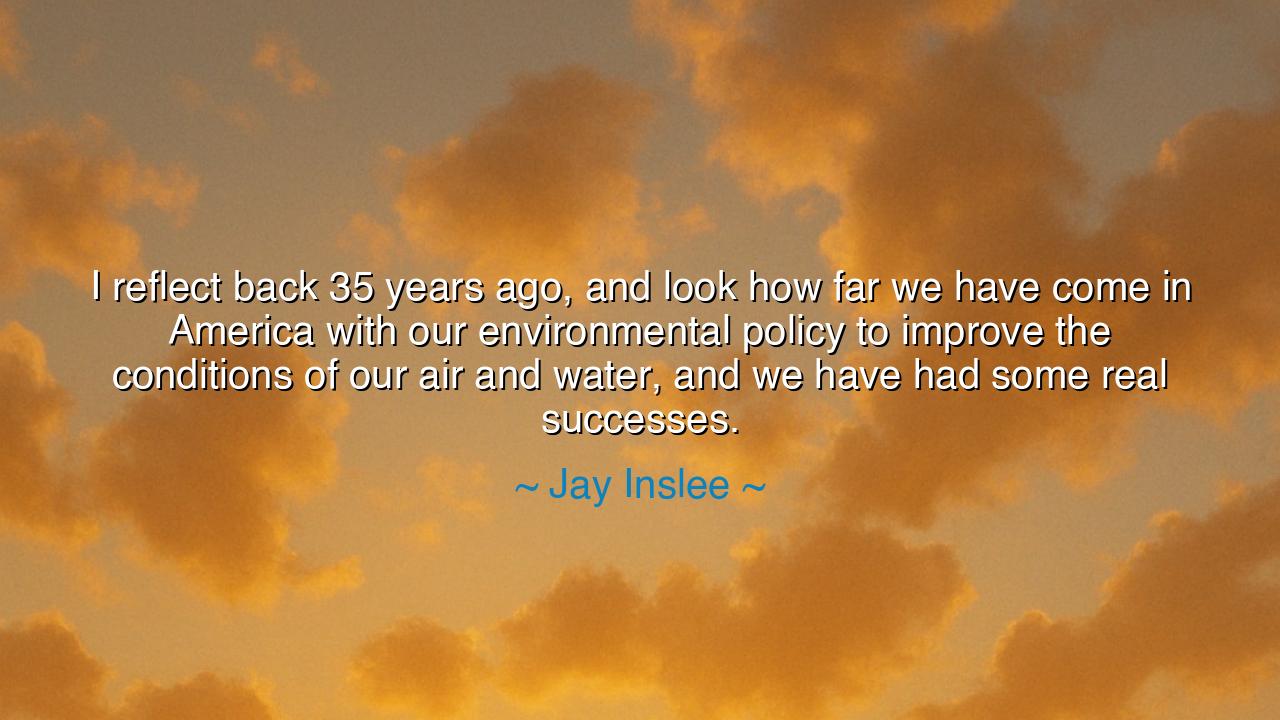
I reflect back 35 years ago, and look how far we have come in
I reflect back 35 years ago, and look how far we have come in America with our environmental policy to improve the conditions of our air and water, and we have had some real successes.






In the words of Jay Inslee, we hear a reflection steeped in both remembrance and triumph: “I reflect back 35 years ago, and look how far we have come in America with our environmental policy to improve the conditions of our air and water, and we have had some real successes.” This statement is not merely political rhetoric; it is the voice of a watchman on the walls of civilization, testifying to a long struggle against decay and reminding us that victory is possible where once only despair seemed to dwell. His words echo like those of ancient elders who would recount the victories of the tribe, so that future generations might not forget the price of endurance.
The meaning of this utterance lies in the acknowledgment that humanity’s dominion over earth has often been careless, yet not without redemption. Air and water, those firstborn elements upon which all life depends, were once shrouded in smog and poisoned by waste. To say we have had “real successes” is to recognize that through wisdom, courage, and law, a people can bend the course of history toward healing. It is the wisdom of the ancients reborn: that stewardship is not weakness but strength, not burden but sacred duty.
The origin of this quote rests in Inslee’s lifelong mission as a guardian of the earth. Spoken by a man who has long championed climate action, it draws upon the legacy of the Clean Air Act and the Clean Water Act—landmark laws that rose in the 1970s when rivers caught fire and skies grew dark with soot. Inslee, reflecting decades later, bore witness to the truth that those laws were not in vain. Through struggle, regulation, innovation, and persistence, the land began to breathe again. The words are less about politics and more about covenant—between man and earth, between present and future.
Consider, for example, the story of the Cuyahoga River in Ohio, which in 1969 burned with flames fed not by wood or coal, but by pollution so thick it became fuel. This fiery symbol of neglect sparked outrage, and from its ashes rose the modern environmental movement. Through policy and vigilance, that river, once forsaken, now flows with fish again. What greater testament to Inslee’s words than the transformation of a river once ablaze into waters that sustain life? This is the “real success” he invokes: not perfection, but resurrection.
The tone of the quote is also deeply emotional, for it carries the weight of memory. Thirty-five years is not a moment but a generation. To reflect upon such a span is to see the arc of time bending slowly, yet unmistakably, toward progress. His words remind us that patience, joined with action, yields fruit. Just as the farmer sows seeds knowing harvest lies seasons away, so too must a society commit to long labor before reaping the blessing of clean skies and flowing rivers.
For the future generations who hear this teaching, let them know: the work is not done. Though victories have been won, the battle is unending. New challenges rise, from warming seas to choking fires, and complacency is the enemy as fierce as any storm. The lesson of Inslee’s words is this: if the past brought progress through vigilance, then the future demands even greater vigilance. We cannot grow weary, lest the successes of yesterday be drowned by the neglect of tomorrow.
Therefore, let this reflection be not merely history but command. Each soul can wield power in the smallest choices: to reduce waste, to treasure water, to walk rather than burn fuel, to vote for leaders who protect creation rather than exploit it. Great laws are born of small voices, and great rivers are saved by the steady hands of many. Inslee’s voice is one among many, but together, they form a chorus that rises like the prophets of old, crying out for the healing of the land.
And so, the final teaching is clear: guard the air, cherish the water, honor the earth. For these are not resources to be spent, but gifts to be protected. Let us be found faithful stewards, so that when another thirty-five years have passed, our descendants may stand upon the same ground and say with gratitude: “Look how far we have come, and how faithfully we have kept the covenant of the earth.”






AAdministratorAdministrator
Welcome, honored guests. Please leave a comment, we will respond soon